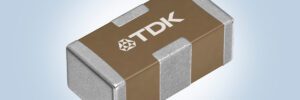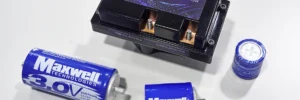
Japanese electronics maker TDK has expanded its YFF series of three-terminal filters for automotive applications to include higher voltages up to 35 V and higher capacitances up to 4.7 µF.
Such components are used to suppress voltage variation and high-frequency noise, which can cause system malfunctions. They can be used for smoothing, filtering and decoupling power lines in automobiles. Mass production of the product series began in June 2025.
The miniaturization of automotive electronic systems is increasing demand for measures to prevent system malfunctions. Numerous capacitors are typically employed in such applications, but the number of components must be reduced because of the miniaturization of these systems. To address these challenges, demand is rising for three-terminal filters, characterized by a low equivalent series inductance (ESL).
By optimizing the material selection and product design, the new products feature higher withstand voltage, ranging from 6.3 V to 35 V and higher capacitance, now ranging from 0.47 μF to 4.7 μF.
The 35 V product has an insertion loss of 40 dB (4 MHz to 2 GHz) and can be used for a broader range of power lines, including both input and output of power-supply systems, while the 4.7 μF product has an insertion loss of 30 dB (300 kHz to 3 GHz) and is more effective as input capacitors than conventional products in reducing voltage fluctuation and countering high-frequency noise. Moreover, depending on set usage conditions, it is possible to halve the component count required to suppress voltage fluctuations to the same extent from the MLCC.
The filters comply with the AEC-Q200 Automotive Electronics Council standards for passive components for automobiles.
Source: TDK
from Charged EVs https://ift.tt/SFnUsVp


No comments:
Post a Comment